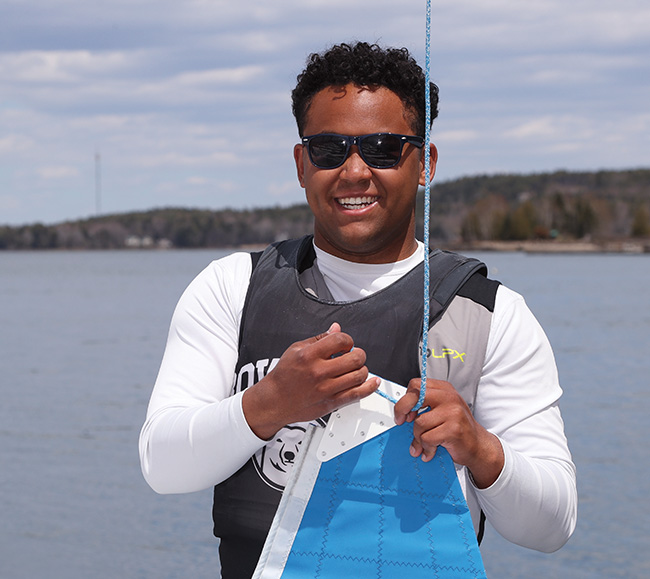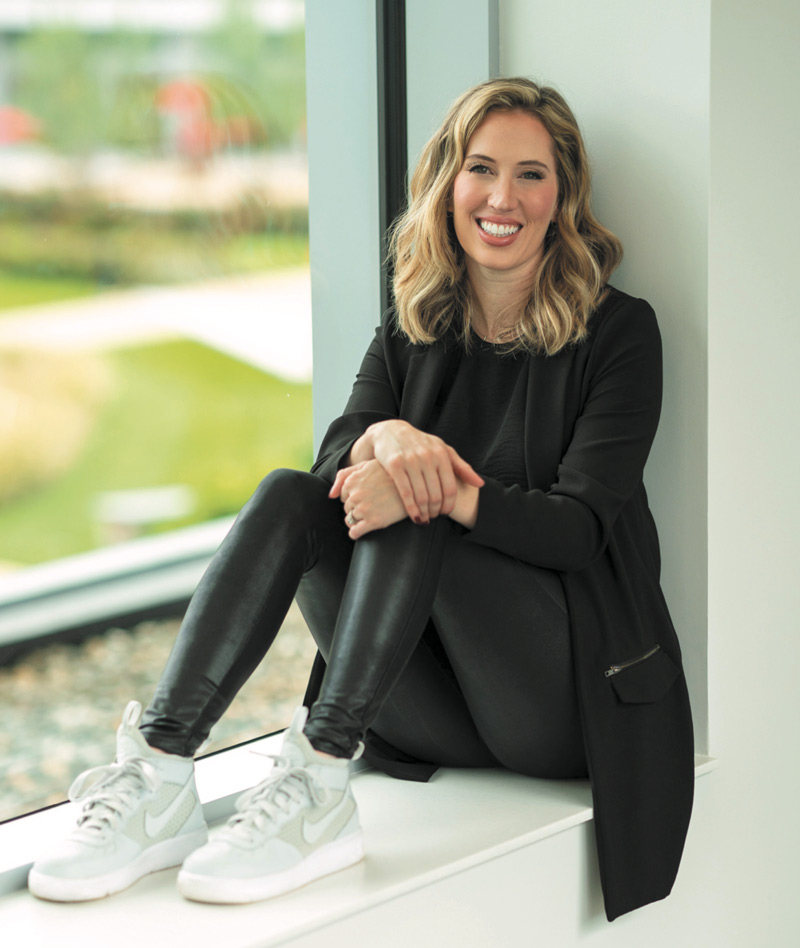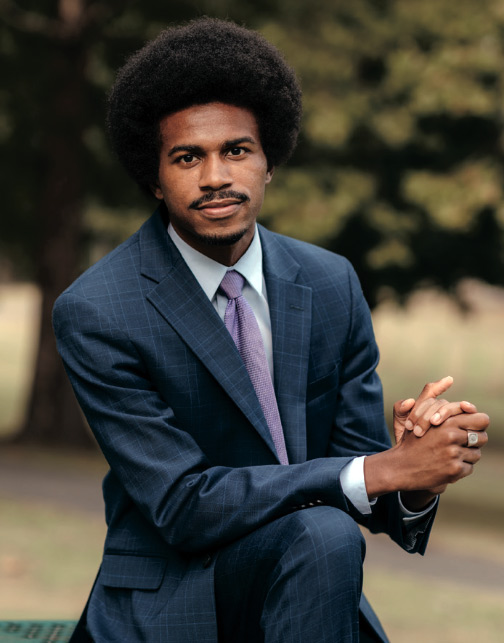Cheers to That
By Bowdoin MagazineThe president and owner of Churchill Events in Portland, Craig Williams ’71 turned the joy of a job well done into a successful career in hospitality, catering, and event planning.
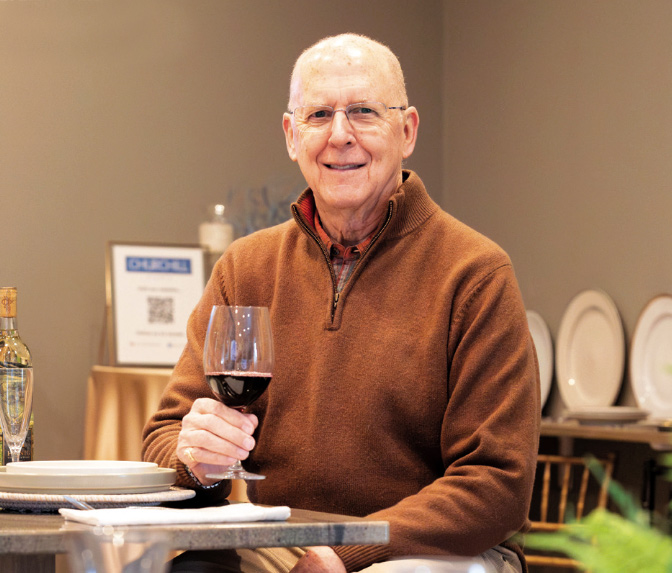
What draws you to your work in food and events?
I’ve always been a “people pleaser.” I’d say it’s been natural for me to want to do something for someone else with the expectation of receiving recognition for a job well done.
Growing up with five siblings ensured competition for praise from our parents for doing a good job. We had weekly assignments: setting the table, helping prep meals, doing the dishes, and helping shop for food items were some of the things we could do to assist Mother with her daily routine and in turn receive her thanks. When I was old enough, assisting with the preparation of items for the nightly family dinner became regular opportunities to cook—and even to experiment with new recipes.
And our parents loved to entertain at home. I didn’t occur to me then, but now when I think of how effortlessly my mother seemed to pull off those annual holiday open-house events (like when 125 friends and neighbors would stop by on Christmas Eve for seasonal cheer), I am pretty sure that led me to end up in hospitality.
How did your career unfold?
During my Bowdoin years, I worked in Moulton Union and a fraternity kitchen. In the summers, I held a variety of resort positions—busboy, waiter, maître d’, food and beverage service manager, and night manager. By then I was hooked.
After US Army training and business school, I joined a Boston-based hospitality management firm. Following a year in the Poconos as a manager-in-training, I moved to assume my first general manager’s position at a beachfront resort in Florida.
During the next few years, I oversaw a group of Hiltons in the Northeast and Florida. During these years, there were many opportunities to stage events: ten new hotel grand openings, political campaign events, nonprofit galas.
Probably the most daunting—and exhilarating—took place when the Super Bowl (XVIII) came to Tampa for the first time. I was tasked with hosting all the NFL team owners for five days in one of our hotels. And on Super Bowl Sunday, we hosted a brunch for 3,500 guests. The biggest challenge was where to set up, because the largest ballroom in Tampa seated three hundred fifty, so we decided to use a “circus” theme. We erected four large tents (one for the culinary and beverage teams to prepare everything and three for food service and guest entertaining). We staged high-wire acts, found servers who could walk on stilts, and “borrowed” thirty-five chefs from other Hilton hotels, who created eight different themed food stations.
I was fascinated to watch and learn how to prepare eggs Benedict for 3,500! A lot of fun, but by the time brunch was over and it was game time, I wanted only to be back in our home in Tequesta (on Florida’s east coast) with my wife and children. So, we headed to the car at the hotel entry and, as I was getting behind the wheel, I asked the nearest person if he was interested in going to the game? Stunned, he said yes, and I handed him my two tickets (eighth row at the fifty-yard line). He’s probably still talking about it!
The next year we moved to the West Indies, to the French side of the island of Saint Martin, where I began a two-plus-year odyssey to oversee the completion of construction of a deluxe resort and to develop the plans to staff and operate it following the construction phase. I opened a sales office in the Waldorf Astoria in New York City. From there we launched our public relations and marketing operations to pre-sell the resort. It was a wonderful time in our lives. Unfortunately, a myriad of issues caused delays—shipping mishaps, water shortages, inexperienced contractors. Murphy’s Law challenged us almost daily throughout the process, and, after two years, I decided we should return to the US.
After that, I was hired to be managing director of The Ritz-Carlton, Washington. It was a busy time in DC. The end of the Reagan era and the beginning of the George H. W. Bush presidency. The Ritz was the social center of Washington then and our hotel’s restaurant, the Jockey Club, was the city’s favorite watering hole. What a great place to experience global event planning—presidents, senators, representatives, lobbyists, and international guests were part of everyday life. My wife and children found living in a hotel to be an exciting brand-new experience, but when the kids began to expect room service meals and limo rides to play groups, Linda and I decided we all needed to live where the kids had their own yard to play in and we could drive ourselves to the grocery store.
Three years later, I started hospitality consulting, and we moved to Maine. Ultimately, we established Churchill Events—an event planning and catering company—in Portland. Twenty-nine years later, we now have a very successful operation (led by a phenomenal team of hospitality professionals) and an enviable client roster. Except for during the COVID era, we have continued to increase our business and revenues/profits each year since our 1996 opening, always expanding our varied assortment of corporate, social, wedding, and nonprofit clients.
What brought you to Bowdoin?
In 1966, with high school graduation looming, I did the normal rounds of college visitations. Bowdoin was the last school I visited, and I knew immediately it was where I wanted to go. It was close to home (Portland) and not too big. The most influential in my decision were the interview and the tour of the campus—I was sold.
I had heard about the value of a liberal arts program and why it was the best way for me to experience college because I wasn’t at all sure what I wanted to do with the rest of my life. I began to understand that education has a one-word definition: exposure. The greatest and most profound result of my Bowdoin experience is the exposure I received to so many different things. In my studies: to history, government, economics, music, and art. In day-to-day life and in my career: to personalities and relationships and how they work and how to manage them.
Without the exposure/education I gained at Bowdoin, I believe strongly that I would not have been witness to the countless experiences that followed, nor would I have achieved the success in business that we have today. And as a Class Agent for the past thirty-plus years, I can maintain connections with my classmates through correspondence and reunion gatherings.
What inspires you?
Opportunities to do totally different things for new or existing clients, and to pull off something that exceeds all their expectations.
Recently, a wedding client wanted to surprise his wife on their tenth anniversary by bringing back the musical group that performed at their wedding reception. We had to book the entertainment; arrange for all the rental items (audio equipment, staging, tents, tables, chairs, china, glassware, flatware, linens, and transportation); provide all the décor elements (floral arrangements, temporary landscaping, lighting); create a special Asian-themed cocktail reception and Spanish-inspired multicourse dinner; and surprise the guest of honor. And the best result—we came in under budget! Everyone was thrilled, especially the client.
That’s inspiration!
Is there something about the work you do that others would find surprising?
What’s not surprising is that it takes a talented team to pull off many of the varied events to succeed in the event planning world. What may be surprising is to learn how something seemingly simple can be extraordinarily complex in its execution.
Checklists are essential—even the most thorough ones can miss a very important element. For one recent event (with a 450-item checklist), I had agreed to look over the entertainer’s (Lionel Richie) contract rider to make sure we could provide everything required. I had not expected the rider to include a twenty-five-page, single-spaced book of required items, including special throat lozenges (available only in London), eighteen dozen towels (in three sizes and four colors, all washed once!), air-conditioned tents (to 64 degrees F) for the backup singers, and five pages just of specific food items for before, during, and after the performance. It took a little study and a lot of phone calls and emails, but we were able to supply everything—Lionel was pleased, and the client was thrilled!
Is there something about you that others might find surprising?
Perhaps it would surprise others to know that I have an ADD diagnosis and can occasionally overlook a detail or two, but I have learned to rely on the talents of my team to fill in the blanks and to keep me focused. And I have an incredible family who have helped all along the way.
In many ways, ADD has been an asset to me. I can take on many tasks (sometimes too many) and accomplish them all as if they had been part of the plan all along. So, I am convinced that the ADD spurs on my creativity, enabling me to make things work, even if it’s something we had not thought of or tried before. I work best under pressure. If you were to see my desk at any time you would be confronted with an indecipherable grouping of projects-in-process—I know what is represented by each, and I know their current status.
The greatest satisfaction I derive from this business is watching as the event unfolds, often providing the final direction to the team members, and observing the clients, whether it’s a blissful bride and groom or the delighted fiftieth anniversary couple or guests at a Bush family gathering on Walker’s Point, their reactions are worth all the efforts put into the planning.
What do you enjoy doing in you spare time?
Travel. My hotel career took us to many different places in and out of the United States. And in more recent years, my wife and I have found that traveling together—often to the countries and the homes of friends we have made along the way—has added to our exposure to many new and different things. We have returned regularly to the West Indies and have visited many of the Caribbean islands, transited the Panama Canal, traveled around Central America, Colombia, and Mexico, spent time on Mauritius, and traveled through Iceland, Scotland, England, France, Italy, Switzerland, and Spain—as well as throughout the South, the West, Midwest, and all around Maine.
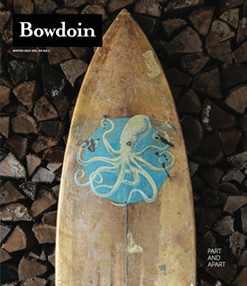
This story first appeared in the Winter 2024 issue of Bowdoin Magazine. Manage your subscription and see other stories from the magazine on the Bowdoin Magazine website.

